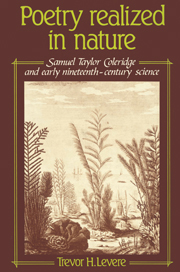Book contents
- Frontmatter
- Contents
- Preface
- Introduction: nature and mind
- CHAPTER 1 Early Years: From Hartley to Davy
- CHAPTER 2 Surgeons, Chemists, and Animal Chemists: Coleridge's Productive Middle Years From the Biographia Literaria to Aids to Reflection
- CHAPTER 3 Two Visions of the World: Coleridge, Natural Philosophy, and the Philosophy of Nature
- CHAPTER 4 Coleridge and Metascience: Approaches to Nature and Schemes of the Sciences
- CHAPTER 5 The Construction of the World: Genesis, Cosmology, and General Physics
- CHAPTER 6 Geology and Chemistry: The Inward Powers of Matter
- CHAPTER 7 Life: Crown and Culmination
- Notes
- Index
CHAPTER 2 - Surgeons, Chemists, and Animal Chemists: Coleridge's Productive Middle Years From the Biographia Literaria to Aids to Reflection
Published online by Cambridge University Press: 09 October 2009
- Frontmatter
- Contents
- Preface
- Introduction: nature and mind
- CHAPTER 1 Early Years: From Hartley to Davy
- CHAPTER 2 Surgeons, Chemists, and Animal Chemists: Coleridge's Productive Middle Years From the Biographia Literaria to Aids to Reflection
- CHAPTER 3 Two Visions of the World: Coleridge, Natural Philosophy, and the Philosophy of Nature
- CHAPTER 4 Coleridge and Metascience: Approaches to Nature and Schemes of the Sciences
- CHAPTER 5 The Construction of the World: Genesis, Cosmology, and General Physics
- CHAPTER 6 Geology and Chemistry: The Inward Powers of Matter
- CHAPTER 7 Life: Crown and Culmination
- Notes
- Index
Summary
German literature and scientific preoccupations
When Coleridge returned from Malta in 1806, he had left Unitarianism behind him and that autumn “was making up his mind how he could become a full Trinitarian.” And his way toward trinitarian orthodoxy was “along the high metaphysical road.” His support along that road came in part from Plato, from the Neoplatonists, and from recent German philosophy. Because the science that best supported post-Kantian idealism was, substantially although not exclusively, German, Coleridge increasingly immersed himself in German philosophical and scientific writings. Here was his introduction to a new philosophy of nature.
In the late summer of 1809 he drew up yet another plan of education, comprising logic, mathematics, ancient history, and “at the same time Lectures on the transition of Mechanics into Chemistry, with such experiments only as are necessary to demonstrate the Numeration-table of the known Undecompounds, Elements of our present knowledge.” Then came psychology, in familiar association with chemistry, followd by metaphysics, theology, and modern history. The novelty in this plan compared with earlier ones is the proposal of lectures on the “transition of Mechanics into Chemistry.” The phrase is susceptible of more than one interpretation, an ambiguity probably intentional and significant for Coleridge. Chemistry had been a part of physics, indeed of mechanics, in seventeenth-century Newtonian natural philosophy. In the early years of the nineteenth century, John Dalton had proposed a specifically chemical atomic theory and the nature philosophers of Germany were developing their very different chemistry of powers.
- Type
- Chapter
- Information
- Poetry Realized in NatureSamuel Taylor Coleridge and Early Nineteenth-Century Science, pp. 36 - 57Publisher: Cambridge University PressPrint publication year: 1981

